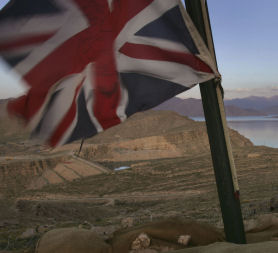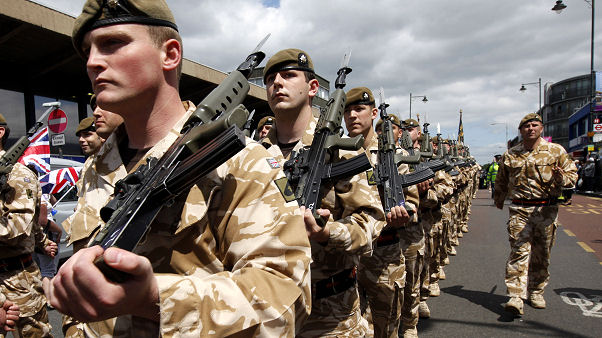Afghanistan: military might cannot win alone
Writing for Channel 4 News as the UK death toll reached 300, former soldier Patrick Hennessey described a significant turning point in war strategy.

In 2007 I spent seven hot months in Helmand as a platoon commander in 12 Mechanised Brigade at what was, in retrospect, a small turning point in the current conflict.
12 Brigade had more man and firepower than the brigades that had come before us and found themselves effectively under siege, but we were insufficiently manned and resourced to do the intensive and productive counter-insurgency work on which subsequent brigades have been engaged.
To use the unfortunately accurate phrase of one officer, we were mostly “mowing the grass.” Patrick Hennessey
The enemy had yet to resort to IEDs as his primary means of inflicting casualties, and our movement was relatively free, if invariably accompanied by an open fight. To use the unfortunately accurate phrase of one officer, we were mostly “mowing the grass”.
We handed over to 52 Brigade, who were commanded by then Brigadier Andrew Mackay who, with Stephen Grey, has outlined for Channel 4 News a 10 Point Plan for the coalition government’s approach to Afghanistan.
Ten-point plan for Cameron in Afghanistan
It was clear even back in 2007 that Brigadier Mackay’s troops had the right focus, and notable that 52 Brigade’s great triumph – the recapture of Musa Qala – was achieved with a minimum of violence.
The handover between the two brigades was perhaps the moment the British Army in Helmand stopped fighting a scrappy small war and started a complex counter-insurgency campaign.
Slow and painful progress
There is a growing sense, however, that the current campaign is at another turning point.
On the ground, even in those places like Nad-e Ali and Sangin, familiar for all the wrong reasons to a sceptical and wearying home front, real progress is being made – but painfully slowly and at a significant cost.
As in Iraq in 2006 and 2007, violence seems to be peaking even as the Americans pour tens of thousands of troops into the south for what many think will be a decisive summer.
There are not yet widespread cries of “Troops out now!”, but there is certainly a growing murmur of “Troops out, soon!” Patrick Hennessey
In the parts of Helmand I revisited at the start of the year, the improvement in security conditions was impressive where troop numbers had increased dramatically. But saturating Afghanistan with troops is neither sustainable nor desirable, and the public is impatient for the time when the Afghan national security forces can stand on their own feet.
There are not yet widespread cries of “Troops out now!”, but there is certainly a growing murmur of “Troops out, soon!”
The very first of the “principles of war”, learnt by all young officers at Sandhurst and throughout their training, is “selection and maintenance of the aim”. The question for many is whether or not in Afghanistan this is increasingly in conflict with another well known military maxim: never reinforce defeat.

The army cannot alone win
British troops and their allies fight stoically to extend the governance of a Karzai regime with virtually no credibility, and despite making rapid progress in the understanding and practice of an increasingly sophisticated form of counter-insurgency, soldiers alone cannot solve problems which are as social and political as they are military.
At a recent “round table discussion” with the head of the army for the magazine Prospect, Rory Stewart – newly elected to the House of Commons, where his valuable expertise will enrich the debate on the matter immeasurably – put exactly that point to General Richards: the army alone can’t win both the military and the political fights.
It’s not just about what’s happening in Helmand, it’s about what’s happening in Kabul.
I would go further and suggest it’s also about what’s happening in Whitehall. While engaged in this most difficult of missions, a fresh and no less serious challenge has presented itself at home in the form of the impending Strategic Defence and Security Review (SDSR) – which must be no less than a complete reappraisal of what our armed forces are and what they are for as we contemplate years of financial constraints, compounding an already significantly overdrawn military budget.
British forces in Afghanistan: why are we there?
Previous similar defence reviews have failed to grasp the opportunity presented and have tended to shy away from big decisions, leading to small cuts across the board which weaken all departments and strengthen none.
The decision to reduce the number of infantry battalions a few years ago put an incredible strain on those soldiers doing the brunt of the work while the army was running medium scale operations simultaneously in Iraq and Afghanistan between 2006 and 2009, and highlighted how counter-productive so called “salami slicing” cuts can be in the long term.
The Chancellor has encouraged everyone to “think the unthinkable” in confronting Britain’s looming deficit, and the military should not be exempt.
Former soldier Patrick Hennessey is the author of The Junior Officers’ Reading Club: Killing Time and Fighting Wars.